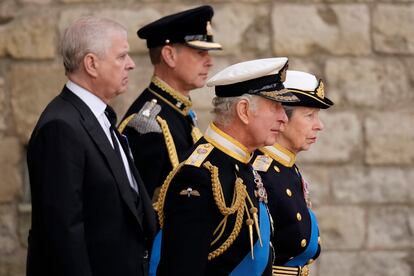King Charles III appoints Prince Edward and Princess Anne as his two new stand-ins
The British monarch has called on parliament to add his brother and sister to the list of counselors of the state, but has avoided snubbing his son Prince Harry and scandal-hit sibling Prince Andrew

King Charles III has decided to appoint his siblings, Prince Edward and Princess Anne, to act as his two new counselors of the state. This means they will be able to stand in for the king of the United Kingdom when he is unwell or unable to attend to his official duties. In a signed message read to the House of Lords on Tuesday, King Charles said he would be “most content, should Parliament see fit, for the number of people who may be called upon to act as counselors of state under the terms of the Regency Acts 1937 to 1953 to be increased to include my sister and brother – the Princess Royal and the Earl of Wessex and Forfar – both of whom have previously undertaken this role.”
Under the current terms of the Regency Acts, five people are allowed to be counselors of the state: the monarch’s spouse, in this case, Camilla, the Queen Consort, and the first four heirs over 21 years of age. On paper, this means that if King Charles cannot attend an event, his wife, his sons, Prince William and Prince Harry; his brother, Prince Andrew; and Prince Andrew’s daughter, Princess Beatrice, may stand in his place.
But two of those names pose problems. Prince Andrew was ostracized from the royal family following the 2019 scandal over his friendship with sexual predator Jeffrey Epstein and allegations he sexually abused Virginia Giuffre when she was a minor, a lawsuit he settled for a million-pound sum. As a result, the prince was stripped of his royal titles and duties. The other problematic name is Prince Harry, who resigned from all royal duties in 2021 and moved to the United States with his wife, Meghan Markle. The move was made amid accusations of racism within the royal family and, since then, his relationship with his brother and father has been distant, to say the least.
If the king is unavailable, councilors of the state can perform tasks such as the state opening of Parliament, attending Privy Council meetings, signing routine documents and receiving ambassadors. They cannot, however, invest prime ministers.
According to the British press, King Charles decided to add names to the list of councilors of the state, instead of relieving Prince Harry and Prince Andrew of the role, in a bid to maintain peace within the royal family and avoid any public embarrassment.
Queen Elizabeth II did not resolve the issue before her death in September but King Charles has moved quickly. Just two months after being proclaimed king – he will be crowned on May 6 – he has begun the process of increasing the number of royals who can stand in for the monarch. The king had been under pressure to do so from parliament, where there were concerns over the possibility of an accused sex offender standing in for the king. The issue was discussed in the House of Lords just a month ago, forcing Buckingham Palace to take action on the matter, according to British newspaper The Times.
Princess Anne was a councilor of the state between 1971 and 2003, until Prince William – today first in line to the British throne – turned 21, while Prince Edward assumed the role between 1985 and 2005, until Prince Harry was 21 years old. The legislation to make the new additions possible, the Counselors of State Bill, should be approved by the British Parliament by the end of the year. This will mean there will be many possible stand-ins for when King Charles and Camilla embark on a royal tour in 2023, a journey that may coincide with other trips that Prince William and his wife, Catherine, Princess of Wales, have planned.
Tu suscripción se está usando en otro dispositivo
¿Quieres añadir otro usuario a tu suscripción?
Si continúas leyendo en este dispositivo, no se podrá leer en el otro.
FlechaTu suscripción se está usando en otro dispositivo y solo puedes acceder a EL PAÍS desde un dispositivo a la vez.
Si quieres compartir tu cuenta, cambia tu suscripción a la modalidad Premium, así podrás añadir otro usuario. Cada uno accederá con su propia cuenta de email, lo que os permitirá personalizar vuestra experiencia en EL PAÍS.
¿Tienes una suscripción de empresa? Accede aquí para contratar más cuentas.
En el caso de no saber quién está usando tu cuenta, te recomendamos cambiar tu contraseña aquí.
Si decides continuar compartiendo tu cuenta, este mensaje se mostrará en tu dispositivo y en el de la otra persona que está usando tu cuenta de forma indefinida, afectando a tu experiencia de lectura. Puedes consultar aquí los términos y condiciones de la suscripción digital.









































